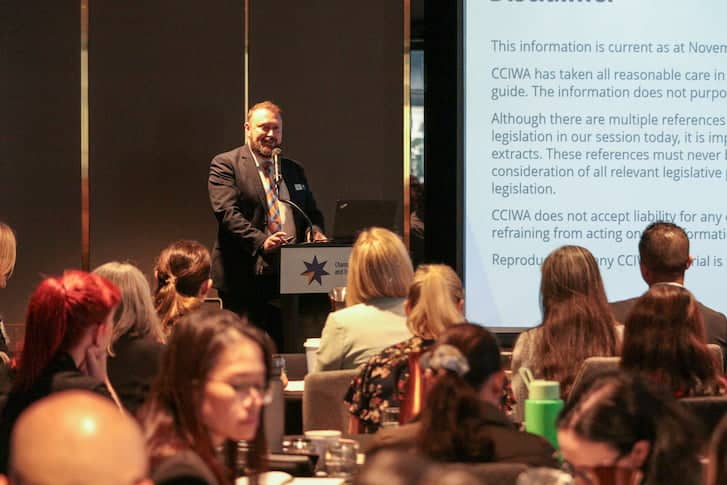Changes to Australia’s industrial relations laws since December 2022 could lead to hefty fines and penalties for businesses, and significantly impact operations.
CCIWA Associate Director of HR and Workplace Relations Ryan Martin outlined the top five IR priorities that need businesses’ attention in the short-term at the HR Live Spring Update on November 21 at the Novotel Hotel, Perth.
Attendees also heard from CCIWA Workplace Relations Legal Director Justin Lilleyman about the impact of redundancy laws on businesses, CCIWA HR & Learning Consultant Cristina Iacob discussed psychosocial considerations for employment conversations, CCIWA Senior Employee Relations Adviser Daniella Raschilla provided a case law update and analysis, and Inclusion Solutions General Manager Matt Shaw discussed removing barriers for inclusive employment.
According to Martin, these are the top five IR changes that should be on businesses’ radar.
1. Respect@Work

CCIWA Associate Director of HR and Workplace Relations Ryan Martin presenting at the HR Live Spring update.
“Respect@Work affects every single business. It has created a positive duty on employers to take reasonable steps to prevent sexual harassment and discrimination occurring in the workplace,” Martin said.
This is breached by doing nothing. Seven guidelines have been released by the Human Rights Commission that aim to help businesses ensure they are complying with positive duty.
“One of the main recommendations is to adopt a risk management process to ensure that you’re identifying potential hazards in respect to sexual harassment and discrimination and then identify and implement controls to minimise the risk of it occurring,” Martin said.
If you need help to understand and comply with this new obligation, you can find more information about CCIWA’s services here: Respect@Work Packs
2. Wage theft and underpayments
It’s important to distinguish between wage theft and underpayments, Martin said, as wage theft requires intention and can lead to imprisonment, whereas underpayments can be unintentional but still have significant penalties.
“The inadvertent underpayments will impact businesses more than wage theft because they happen all the time,” he said.
“No one intends to underpay in these circumstances but it’s because awards and the entire industrial relations framework is so complex. Big companies, small companies – everyone gets it wrong from time to time, despite having the best intentions so it will be important to ensure you implement objective processes so you can demonstrate you have taken steps to minimise the risk of underpaying employees.”
CCIWA Members get access to our award allocation service with their membership which will assist with compliance and can also engage our HR Consulting team to undertake a wage audit to check if you are paying your employees correctly.
3. Casual employment
The definition of casual employment has changed, and employees can provide written notification when they believe they no longer meet the definition of a casual employee.
Martin said the new definition relies on what happens in practice, not just the contract.
“The Fair Work Commission (FWC) will look at contracts and consider certain criteria, like whether there is an absence of firm advanced commitment to continuing and indefinite work,” he said.
“The other main difference is now that employees have the right to convert to part time or full-time work where they think they no longer meet this definition.”
CCIWA’s legal practice, Business Law WA, is offering a free initial review of employment contracts to check what updates should be made to be compliant with the changes. To book in a Red Flag Review, email [email protected].
4. Intractable bargaining
If two parties (usually an employer and union) negotiating for an enterprise agreement can’t come to an agreement and it reaches the intractable bargaining threshold, the FWC can intervene to arbitrate the terms which have not been agreed.
Martin said while this may sound reasonable, the important detail is that the FWC cannot make a ruling that is less favourable to employees than any terms in an existing enterprise agreement.
“This gives the union little incentive to negotiate because if they haven’t got the terms that they wanted, the union can drag the employer to the Commission and know that they’re not going backwards on anything that hasn’t been agreed,” he said.
“So, it is more important than ever to have a strategy in place before you commence bargaining, or you could end up with an enterprise agreement that is very unfavourable for your business.”
If you need support with developing an effective strategy, CCIWA has a team industrial relations consultants experienced in the area of enterprise bargaining with unions, so before commencing negotiations consider contacting our Employee Relations Helpline for more information.
5. Right to disconnect
Martin said the huge amount of media attention on right to disconnect created misinformation, particularly around the employee’s perspective as to what the right means.
“It’s not a preventative right, so it doesn’t mean that employers can’t attempt to contact their employees, but [it relates to] the employee’s right to not monitor or respond, unless it is unreasonable which depends on various circumstances,” he said.
It also includes general protections for employees who are able to, and choose to, exercise the right.
Any policy or communication on right to disconnect needs to be carefully drafted, which CCIWA can assist with by emailing [email protected].
CCIWA can assist your businesses will all the IR law changes, including the five items outlined above.
Our Employee Relations Helpline is also available to respond to your questions on (08) 9365 7660, or via [email protected].
Or, if you would like to speak to one of our employment lawyers, get in touch on (08) 9365 7560 or via [email protected].












